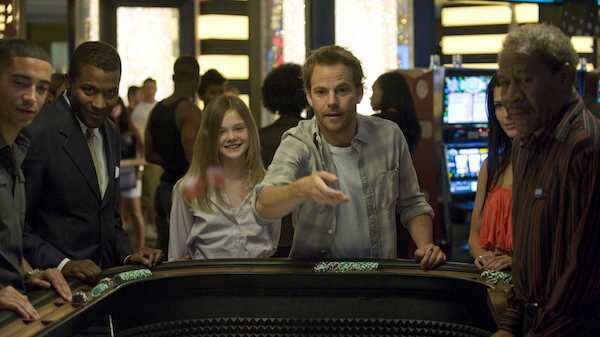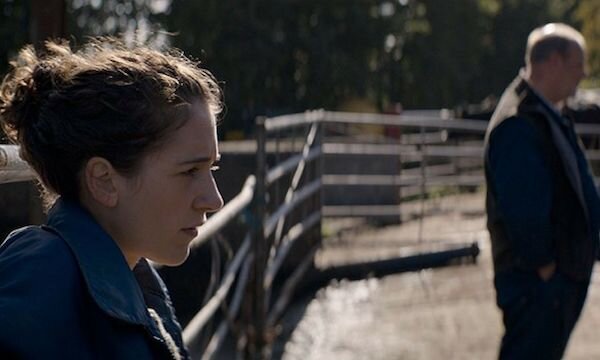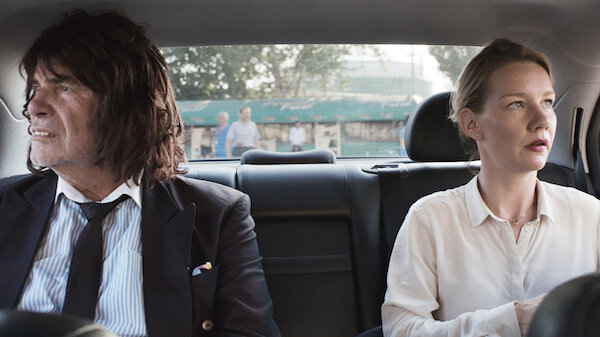Working through long-distance relationships, sudden deaths and fraught adulthoods, the complex dynamics of father-daughter bonds can manifest in many different ways. This Father’s Day, Victoria Rodrigues O’Donnell chooses three titles – Somewhere, The Levelling and Toni Erdmann – to excavate these wounds.
My dad grew up in Sheffield during the 1960s and 70s, the child of Irish immigrants. By the age of 15, he was already collecting glasses in a local working men’s club and at 19 he was managing the place. His coming-of-age coincided with Margaret Thatcher taking office, the Falklands War, and the release of “Ghost Town” by The Specials. When I was the same age, I could only measure my life in A-Level revision notes and flashcards. Faced with the expectation to find a Saturday job and with university looming on the horizon, I felt overwhelmed, but I did not feel I could talk to my dad about it. Disguising my worry with teenage sulking, I started to doubt that I could ever live up to his aspirations for me.
Narratives addressing the complex tensions between fathers and daughters offered endless ways for me to understand my own dad. The constraints of time are particularly noteworthy when looking at Somewhere, The Levelling and Toni Erdmann, three films from the last decade scrutinising the struggle for fathers to connect with their daughters. All three films, written and directed by women, centre on an onerous father-daughter relationship, yet the ages of the daughters vary from preadolescence to adulthood. By portraying the different stages in the daughters’ lives, these films examine the responsibility of fatherhood and the failures which can occur, often despite the fathers’ best wishes.
Somewhere, Sofia Coppola’s 2010 tender drama, follows the lonely and apathetic Hollywood actor Johnny Marco. He’s often shown slumped in his apartment at the Chateau Marmont, a location notorious for Hollywood hedonism, as women come to entertain him. This aimless debauchery is suddenly challenged by the surprise arrival of his 11-year-old daughter Cleo, after her mother decides to take an indefinite break from being the primary carer. Johnny is easily distracted while watching Cleo attend a figure skating lesson. He stays looking at his phone until he sees her perform a series of jumps and becomes completely captivated by his daughter’s skill. She elegantly twists and turns on the ice as Gwen Stefani’s “Cool'' plays across the rink. In the car on the way home he asks her, “When did you learn how to ice skate?” Johnny is taken aback when Cleo flatly replies that she has been going for three years. From this, the film questions what else Johnny might not know about his daughter.
The slow pace of Coppola’s direction patiently beholds Johnny’s solitary moments, as he aimlessly drives around Los Angeles or drinks and smokes alone at a café. When attending a press junket for his upcoming film, Johnny is left stumped by one question: “Who is Johnny Marco?” He does not know what to say, and leaves the question unanswered. The weight of this query is physically felt later, while he has a cast of his head made by special effects artists. He is told to sit for 40 minutes, with his eyes and lips closed, beneath the claustrophobic plaster. Coppola lets the camera silently sit with this image, just as Johnny is left to sit with his inability to be himself, and admit that he does not know who that person is.
Taking care of Cleo does not immediately reform Johnny’s louche behaviour. During a publicity trip to Italy, she awkwardly makes small talk over breakfast with an unknown woman. The woman politely asks Cleo about herself and whether she has a boyfriend before Johnny joins them. Cleo knows the woman stayed the night with her father, and her quiet disapproval manifests itself in knowing glares, suggesting that she is more aware of Johnny’s lifestyle than she has ever let on. Several scenes emphasise Cleo’s maternal approach towards her father; she cooks eggs Benedict from scratch, much to his and his friend’s amazement. She similarly catches Johnny off guard when breaking down in tears while he drives her to summer camp. Johnny is faced with the reality that he is responsible for this little girl, and that he must play a more active role in her life before it is too late.
Little girls grow up to be adults with greater agency and independence, as seen in Hope Dickson Leach’s debut The Levelling, which is told from the perspective of Clover, a young woman who returns to the family farm following the death of her brother Harry. She is consumed by grief while having to assist with the quotidian realities of running a farm. Unlike Somewhere, The Levelling makes clear from the first few minutes that Clover has a dysfunctional relationship with her father. In response to a local’s consolatory remark she tearfully asks, “Can you make it my dad instead of my brother? Can you make that happen?”
Dickson Leach intersperses shots of bleak fields with strained dialogue between Clover and her estranged father, whom she calls by his first name Aubrey. The reasons behind such reticence unravel in passive aggressive bursts. Clover suggests that her brother was unhappy, to which Aubrey tells her not to be stupid. This prompts her to proudly retort, “I’ve got four A-Levels, two degrees and I’m about to be fully qualified as a vet. I’m not bloody stupid.” Racked with regret over Harry’s death, she is chastising herself as much as she is her father; she left Harry to look after the farm, to cope with their father alone and to deal with the aftermath of flood damage.
Aubrey’s unsentimental attitude comes up against Clover’s difficulty grieving. He hands out jobs and tells her to get up and milk the cows. This stoicism and refusal to accept his son’s death as suicide may be his coping mechanism, but Clover stubbornly eschews repeating past mistakes; she reminds him that he sent her to boarding school and did not let her return for her mother’s funeral. Now as an adult, she tries to get a true picture of what led to her brother’s death, regardless of how many times she is reprimanded for choosing to leave the farm in the first place. Aubrey tells her to go. “You always did what you wanted. No reason to stop now.” But Clover cannot leave. As well as the future of the farm, she must help her father acknowledge the trauma they have shared and in doing so, make amends.
In contrast to The Levelling, Maren Ade’s 2016 comedy-drama Toni Erdmann offers a lighter meditation on estrangement between a father and daughter. The father, Winfried, plays practical jokes on everyone around him. His careerist daughter Ines works for a consultancy firm in Romania. During a visit home, Winfried sees her sneak off to the garden and pretend to be on a work call instead of spending time with her family. Not long after, she is surprised by a visit from him while at work in Bucharest.
Ridiculous false teeth and a dishevelled black wig are all part of Winfried’s disguise as the eponymous “Toni Erdmann”. He appears at restaurants and corporate functions, introducing himself to Ines' friends and colleagues (who are not aware of Toni’s real identity) as a “life coach”. Winfried tries several ways of ascertaining her happiness. When he directly asks her, she bites back, refusing to give into his existential probing. Yet, the longer Ines is forced to spend time with her wisecracking father, the more she comes to re-evaluate the painstaking effort she puts into her corporate job.
Ines’ severity begins to unravel when she hosts a party in her apartment. While normally stern and reserved, she quickly gives up trying to put together the perfect outfit and answers the door in just her knickers. “It’s a naked reception,” she tells her boss, who returns ten minutes later entirely nude. The guests politely accept this bizarre situation until they are stunned by a mystery figure wearing a huge, furry Bulgarian folk costume. The figure shortly leaves, without explanation. The scene culminates with Ines going after them in a nearby park, wearing only a robe. She chases after them and shouts “Papa”, knowing this figure must be her father, before embracing him tightly. Ines has finally accepted her father’s love and, in doing so, acknowledges how absurd her obsession with work has been.
Watching these three films, I am reminded of how writer and academic Katherine Angel puts it in her essay Daddy Issues: “The anger and rage we might feel towards a father… is not something we can expel, once and for all… love and hate are not opposites, but are developmentally entangled. We have to be able to hate in order to love.” All too often I have grappled with how best to love my dad when I am filled with fury or resentment. Perhaps we are simply too alike, unable to back down when we should; berating each other for our own faults.
The characters in Somewhere, The Levelling and Toni Erdmann are also attempting to communicate with each other while embracing this complex relationship between love and hate. Cleo’s disapproval of Johnny’s romantic liaisons; The heated arguments between Clover and Aubrey; The embarrassment Ines feels when Winfried makes a joke. As I edge closer to the age my dad was when he had me, I am beginning to understand that fatherhood is not about striving for perfection, but making mistakes and learning from them. Something that I wish I were able to tell my younger self.
Victoria Rodrigues O'Donnell (@vrodriguesod) is a museum assistant and freelance writer, with work appearing in Art UK, The Quietus, Oh Comely, Orlando, BFR Mag, Ache Magazine and Lecker Zine.




